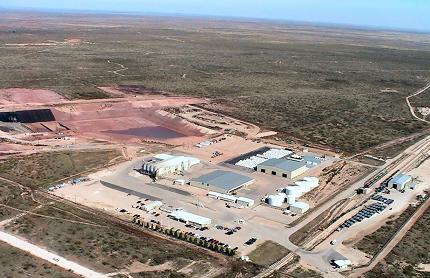The Texas House of Representatives has voted in favour of allowing Dallas-based Waste Control Specialists (WCS) to dispose of low-level radioactive waste (LLW) from 36 other US states at its facility in Andrews County, Texas.
 |
| WCS's Andrews County facility (Image: WCS) |
The Texas Low-Level Waste Compact Commission (TLLWCC) - which is responsible for administering the provisions of the waste compact between Texas and Vermont - had previously approved rules to accept the waste from the 36 states on a case-by-case basis.
The House bill calls for no more than 30% of the waste disposal facility's capacity to be made available to non-compact states, while 56% will be allocated to waste from Texas and 14% for LLW from Vermont. WCS will not be allowed to accept more than 50,000 cubic feet (1415 cubic metres) of non-party compact waste annually and will not be able to accept an average of more than 120,000 curies of radioactivity of non-party compact waste annually over the first ten years of operation, with a total annual limit of 220,000 curies of radioactivity. The Texas Commission on Environmental Quality (TCEQ) will be required to conduct a study on the available volume and radioactivity capacity of the facility for the disposal of waste. The TLLWCC would use the results of this study to anticipate the future capacity needs of the facility.
Under the bill, an application for approval of the importation of non-party compact waste may be submitted to the TLLWCC only by the generator of the waste. The bill bans the acceptance of waste of international origin for disposal at the facility.
Generators from non-compact states would pay a 20% surcharge for their imported waste. The bill also allows Texas to enter into compacts with other US states for the disposal of LLW in Texas "only if the compact limited the total volume of low-level radioactive waste to be disposed of from the other party states to 20% of the annual average projected to be disposed of in this state from 1995 through 2045." The cost to other states of joining the compact would be $30 million up to 2018 or $50 million thereafter.
The amended bill will now return for a vote in the Senate, which passed the earlier version last month.
In August 2008, WCS awarded a contract to URS to lead the design and construction of a new LLW facility in Andrews County. The three-year, $80 million contract included the addition of a railway loop and facilities for unloading waste from rail cars, as well as the construction of two landfills for different categories of radioactive waste. Construction of the LLW disposal facility is under way and expected to be completed in late 2011.
LLW materials are typically lightly soiled plastics, clothing, resins and equipment but also sometimes larger items including components of dismantled nuclear plants.
US states have formed compacts for LLW management at shared facilities and that has resulted in a fragmented regime for waste disposal. A facility run by Energy Solutions at Barnwell, South Carolina only takes wastes from that state, New Jersey and Connecticut, while one in Richland, Washington run by US Ecology accepts wastes from the Northwest and Rocky Mountain compacts. Energy Solutions' Clive facility in Utah is currently used to dispose of the vast majority of US commercial nuclear power plant LLW, about 100,000 cubic yards (76,000 cubic meters) per year.
A three-state compact to dispose of LLW from Texas, Maine and Vermont in Texas was approved by Congress in 1998, although Maine later withdrew after decommissioning its only nuclear power plant.
Researched and written
by World Nuclear News




_30199.jpg)
_72306.jpg)

_49562.jpg)





